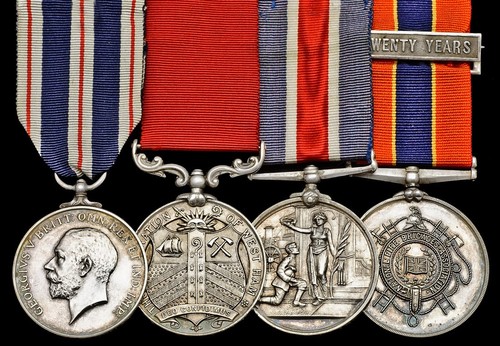
Auction: 14003 - Orders, Decorations, Campaign Medals and Militaria
Lot: 17
An Emotive K.P.M. Group of Four to Fireman, Later Chief Fire Officer J.H.R. Yabsley, for the Silvertown Explosion, 19.1.1917, one of the Worst Civilian Tragedies of the Great War.
a) King's Police Medal, G.V.R., 1st type (James Henry Rich Yabsley, Fireman, West Ham F.B.), with Gallantry riband
b) Corporation of West Ham Bravery Medal, silver, obverse featuring the Corporation's Arms, the reverse featuring a shield bearing a fireman’s helmet and axe, ‘Presented for Bravery’ inscribed around, and the shield engraved ‘To Fireman James H.R. Yabsley’, the edge inscribed '19th January 1917’
c) Association of Professional Fire Brigade Officers Long Service Medal, silver (Sec. Officer J.H.R. Yabsley. 1919)
d) National Fire Brigades Association Long Service Medal, silver (Hallmarks for Birmingham 1924) (2922 James H.R. Yabsley.), with ´Twenty Years´ top silver riband bar, good very fine or better, with the following related items:
- The recipient's two riband bars, pre and post the 1933 change in the gallantry riband for the KPM
- The recipient's Great War 'Stone Hall' Masonic Medal, silver (Hallmarks for Birmingham 1925), reverse named 'Bro. J. Yabsley. No.1828'
- Various Certificates of Discharge from the Merchant Navy, and letters of recommendation
- Large portrait photograph of the recipient
- Various other photographs, and a large file of research on the Silvertown Explosion (lot)
K.P.M. London Gazette 1.1.1918 Fireman James Henry Rich Yabsley
The Recommendation states: 'On the 19th January 1917, a very serious explosion took place at Silvertown. The West Ham Fire Brigade were summoned and on arriving with their engine were told to save themselves as they could do no good. Nevertheless, though well aware of the danger, they began to couple their hose. The explosion took place blowing away the engine. Sub-Officer Henry Vickers and Fireman Frederick Sell were killed, and Station Officer Samuel Betts, and Firemen James Betts, Henry Chapple, and James Yabsley were injured.'
Chief Fire Officer James Henry Rich Yabsley, K.P.M., born Salcombe, Devon, February 1869; enlisted in the Royal Navy, March 1885; invalided out, February 1889; subsequently served in the Merchant Navy before joining the West Ham Fire Brigade; served throughout the Great War and present at the Silvertown Explosion, 19.1.1917, where his crew of six was the first to attend the chemical factory where fire had reached 50 tons of T.N.T.; seriously wounded in the head by the explosion, Yabsley was fitted with a silver plate in his crown for the rest of his life; subsequently appointed Chief Fire Officer at Penge. He retired in 1935
The Silvertown Explosion
The Brunner Mond Chemical Works was established at Crescent Wharf, Silvertown, East London in 1893 for the production of caustic soda. Production ceased in 1912 but the building remained. With the onset of the Great War and the huge demand for munitions, the plant was reactivated but was this time utilised for the purification of the high explosive T.N.T. On the evening of the 19th January 1917, a fire broke out in the factory. As the news spread, many living in the immediate area and knowing the nature of the plant fled. Others, like the plant’s chief chemist Andreas Angel (awarded a posthumous Edward Medal), knowing full well the danger they were in, rushed to tackle the blaze. Amongst the first on the scene were firemen from a nearby station, including amongst their number, Fireman James Yabsley.
At 6.52 p.m. a huge explosion ripped through the factory, utterly destroying the place and devastating the surrounding area. The shock waves of the explosion were felt throughout London and the explosion heard over 100 miles away, and the resulting fires could be seen over 30 miles away. More than 900 homes were destroyed; a further 60,000 others were damaged to some degree; red hot metal was blasted far and wide causing subsidiary fires - a gas holder on the Greenwich Peninsula blew up as a result and many dockside warehouses caught fire. 73 people lost their lives, including several firemen, with a further 400 injured. It was one of the worst civilian tragedies of the War.
Subject to 20% VAT on Buyer’s Premium. For more information please view Terms and Conditions for Buyers.
Sold for
£2,400




